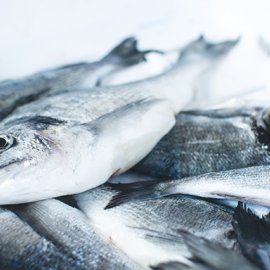Arctic Fisheries Management
-
English
-
ListenPause
Welcome to World Ocean Radio… I’m Peter Neill, Director of the World Ocean Observatory. As fisheries worldwide are being seriously depleted by over-fishing and illegal, unregulated harvest in the ocean beyond the interests and protections of national exclusive economic zones, focus has shifted from artisanal and coastal fishing to new grounds in faraway places, accessible by larger vessels and new technologies and presumably filled with all those fish that have gotten away from the innumerable hooks and insatiable nets. With the melting of sea ice in the Arctic and Antarctic, those areas have been inevitably invaded, raising obvious concerns that the ethos of total consumption will extend to those areas with depletion and final collapse a foreseeable outcome. The pressure is enormous and fisheries has joined the major categories for natural resource exploitation in those regions – oil, gas, precious metals, and now protein suddenly available in these remote waters. If we look to the Arctic as the most viable example, and as the area grows annually bigger with faster and more extensive melting of the sea ice, the temptation to exploit grows exponentially. What to do? In July 2015, five peripheral nations met in Oslo, Norway, to discuss regulatory prospects. In a joint declaration, they recognized the removal of barriers to the area as a result of climate change, the threat to an unique, shared ecosystem, the environmental dangers, the problems of jurisdiction, the lack of scientific knowledge, and the threat by commercial interests with no management regulations or authority in place. They also acknowledged the value of the traditional knowledge and experience and the impact of new development on these local users and their communities. The self-imposed limits were conservative: no authorized presence of national vessels outside one or more regional fisheries management organizations; establishment of a joint program of scientific research; compliance of interim measure with relevant international law; coordination of monitoring control and surveillance activities in the area; assurance that non-commercial fishing does not undermine the agreement; and commitment to respect, cooperation, and continuing process. In April 2017, according to a report by the Pew Charitable Trusts, these five nations, joined by delegations from Iceland, China, the European Union, Japan, and South Korea, took the agreement forward in a legally binding agreement that would prevent commercial fishing in 1.1 million square miles of the Central Arctic Ocean until a science-based fishery management measure is in place. The new proposal built on and extended the earlier precautionary approach by specifying a joint research program, formally incorporating indigenous knowledge into management policies, and completing the legal description of the area to be covered, procedures for decision-making, and outlining the conditions for additional management an oversight. This resolve was far more direct, proscriptive, and responsive to the sudden increase by 40% of the area in the region open, ice-free as open water, for the first time in human history. I never know quite what to make of these declarations. On paper, on the surface, they communicate real intent and purpose. But I never know what happens after: how the research projects are implemented, researched, and published; how the regulatory specifics are defined, applied, and enforced; how the funds are accrued and distributed; how what is said is what is meant, how what is meant is what is done, how what is done actually relates to and advances what the process is meant to be. I tend to be disappointed when, a year or so later, the follow-up meeting reveals some few incremental steps forward, much stasis, some unexpected circumstance that compromises or diverts from forward motion. Diplomats, delegates, and negotiators survive by taking the longer view. They understand the inherent stop-time of consensus building. They see progress in terms of interval from report to report, conference to conference, declaration to declaration, election to election, over a temporary appointment or long career. They are accountable to best intentions, possible goals, shifting priorities, and rationalized outcomes. I often wonder what would be progress to what ends if the only participants at the table were the persons who actually lived in this changing circumpolar world, whose ideas, in short term reality even as they are derived from the longest traditional view, would shape a very different message for all the world to hear. We will discuss these issues, and more, in future editions of World Ocean Radio.
As fisheries worldwide are being depleted by over-fishing and illegal, unreported, and unregulated fishing (IUU), interest in an ever-expanding Arctic is growing exponentially. In this episode of World Ocean Radio, host Peter Neill outlines a July 2015 meeting of five Arctic nations during which catch limits were imposed; and a follow-up meeting in April 2017 in which delegates from five additional countries took the agreement a step forward toward legally binding, an effort that would prevent commercial fishing in parts of the Central Arctic Ocean until science-based fisheries management measures could be put in place.
About World Ocean Radio
Peter Neill, Director of the World Ocean Observatory and host of World Ocean Radio, provides coverage of a broad spectrum of ocean issues from science and education to advocacy and exemplary projects. World Ocean Radio, a project of the World Ocean Observatory, is a weekly series of five-minute audio essays available for syndicated use at no cost by college and community radio stations worldwide. A selection of episodes is now available in Portuguese, Spanish, French, Swahili, and Mandarin, enabling us to reach 75% of the world's population. For more information, visit WorldOceanObservatory.org/world-ocean-radio-global.
Image credit
Jakub Kapusnak for Unsplash
Resources from this episode
< Oslo Declaration on High Seas Fishing, Central Arctic Ocean
< Pew Charitable Trust Report: Historic accord would prevent commercial fishing until sustainable catch is ensured
- Login to post comments



